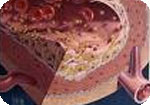The health of your bones and muscles are a good indication of how strong, supple and generally healthy the body is. Stiff, brittle bones are not only a sign of ageing; they can be an indication of a poor diet, and can cause or worsen a whole range of illnesses. bone health
Bone density is the amount of bone tissue present in the bone, and bone mineral density measures the amount of calcium in the bones. This can be a good guide as to how strong our bones are, and bone density usually decreases as the body ages. The rate of bone density loss can vary, but usually begins after the age of 30.
osteoporosis
All the bones in our bodies consist of a thick outer wall and a strong inner mesh which is made up of collagen, calcium salts and other minerals. This inner mesh can weaken to create spaces within the bones, causing problems like fragile, easily broken and porous bones- a process known as osteoporosis.
Factors that increase the risk of osteoporosis include a lack of calcium in the diet, poor absorption of nutrients, and other genetic and hormonal problems.
Bone mineral loss begins long before any outward signs are seen. Therefore it is important to eat a healthy, well-balanced diet, including foods with a range of vitamin and minerals. Calcium is essential for healthy bones, and for it to be properly absorbed, vitamin D also needs to be present. Vitamin D can be obtained from sunlight, and the best food source is oily fish. Regular exercise, especially weight-bearing exercise like walking and tennis, are also helpful in building and maintaining bone strength.
Muscle Health
Body muscles, just like bones, begin to decline and lose mass with age. This is a process called 'sarcopenia'health implications and weaknesses that can make bone thinning problems worse. and refers to the loss of skeletal muscle mass. This loss of muscle is often hidden as the body simply replaces muscle with fat. Muscle loss can lead to
Creatine and carnosine are natural compounds found in skeletal muscles and made up of amino acids. Clinical studies have shown that these compounds can increase muscle strength and slow down skeletal muscle loss. Good food sources are complete proteins like poultry, meat and fish.
Studies have also shown that the two amino acids, l-arginine and l-lysine, when taken together prompt the natural production of human growth hormone, which increases muscle mass and bone density.
For healthy, supple bones and muscles, it is essential to include plenty of good-quality proteins in your dietfish, poultry, meat, eggs, which all provide a complete protein on their own. Vegetables need to be eaten in combination, like pulses and legumes with cereals, to obtain a complete source of protein. from an early age. The best food sources include
References
Bone density is the amount of bone tissue present in the bone, and bone mineral density measures the amount of calcium in the bones. This can be a good guide as to how strong our bones are, and bone density usually decreases as the body ages. The rate of bone density loss can vary, but usually begins after the age of 30.
osteoporosis
All the bones in our bodies consist of a thick outer wall and a strong inner mesh which is made up of collagen, calcium salts and other minerals. This inner mesh can weaken to create spaces within the bones, causing problems like fragile, easily broken and porous bones- a process known as osteoporosis.
Factors that increase the risk of osteoporosis include a lack of calcium in the diet, poor absorption of nutrients, and other genetic and hormonal problems.
Bone mineral loss begins long before any outward signs are seen. Therefore it is important to eat a healthy, well-balanced diet, including foods with a range of vitamin and minerals. Calcium is essential for healthy bones, and for it to be properly absorbed, vitamin D also needs to be present. Vitamin D can be obtained from sunlight, and the best food source is oily fish. Regular exercise, especially weight-bearing exercise like walking and tennis, are also helpful in building and maintaining bone strength.
Muscle Health
Body muscles, just like bones, begin to decline and lose mass with age. This is a process called 'sarcopenia'health implications and weaknesses that can make bone thinning problems worse. and refers to the loss of skeletal muscle mass. This loss of muscle is often hidden as the body simply replaces muscle with fat. Muscle loss can lead to
Creatine and carnosine are natural compounds found in skeletal muscles and made up of amino acids. Clinical studies have shown that these compounds can increase muscle strength and slow down skeletal muscle loss. Good food sources are complete proteins like poultry, meat and fish.
Studies have also shown that the two amino acids, l-arginine and l-lysine, when taken together prompt the natural production of human growth hormone, which increases muscle mass and bone density.
For healthy, supple bones and muscles, it is essential to include plenty of good-quality proteins in your dietfish, poultry, meat, eggs, which all provide a complete protein on their own. Vegetables need to be eaten in combination, like pulses and legumes with cereals, to obtain a complete source of protein. from an early age. The best food sources include
References
- Rosenberg I H Sarcopenia: Origins and Clinical Relevance. Journal of nutrition Vol. 127 No. 5 May 1997, pp. 990S-991S
- Buz'Zard AR, Peng Q, Lau BHS Kyolic and Pycnogenol increase human growth hormone secretion in genetically-engineered keratinocytes Growth Hormone & IGF Research Volume 12, Issue 1, February 2002, Pages 34-40
- Source : http://www.healthymuslim.com/Tips for a Healthy Body: Bones and Muscles --------------------------------------------------------------------------------------------------------
-


No comments:
Post a Comment